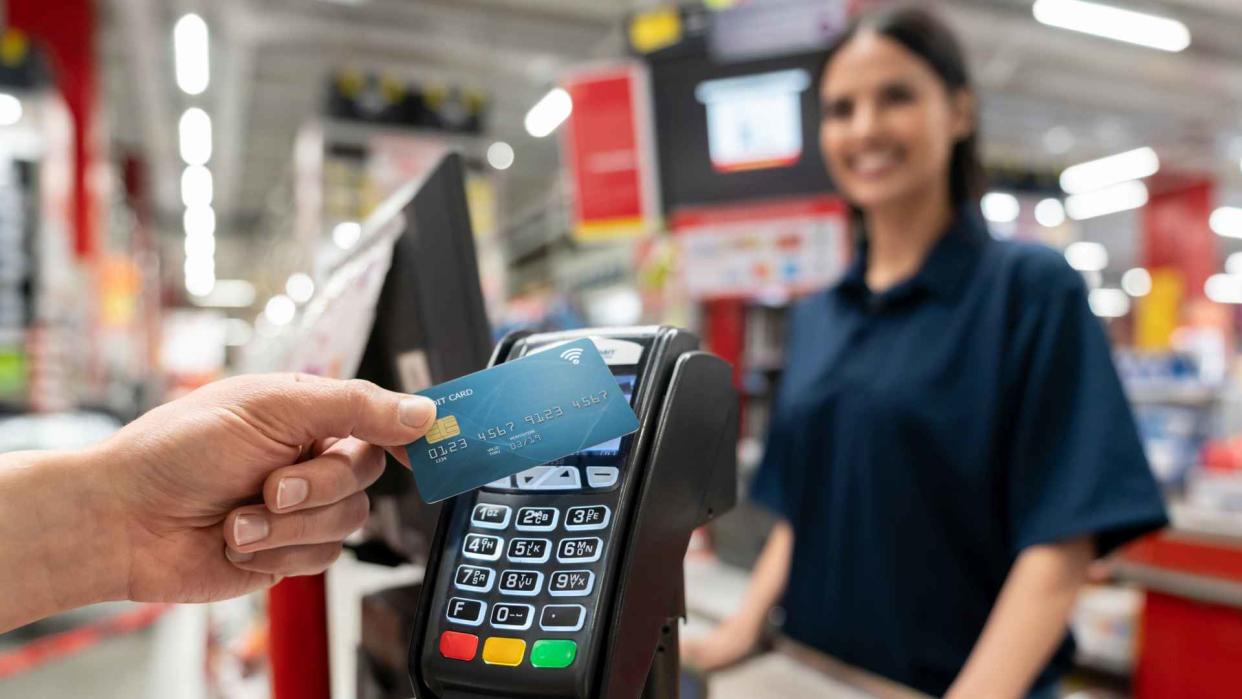Experts: Here’s Why Nearly Every Purchase Should Be On a Credit Card

How do you know which purchases, whether they’re big or small, should be put on a credit card?
Check Out: 5 Unnecessary Bills You Should Stop Paying in 2024
Find Out: Owe Money to the IRS? Most People Don’t Realize They Should Do This One Thing
Making this decision depends on the kind of purchase you plan to charge and how responsible the cardholder is with their credit card use.
Sponsored: Owe the IRS $10K or more? Schedule a FREE consultation to see if you qualify for tax relief.
Put These Purchases on a Credit Card
Take a closer look at the purchases you should be putting on your credit card as long as you can afford the costs.
Travel Purchases
Use a credit card for travel purchases largely out of necessity, said Freddie Huynh, who is the vice president of data optimization with Freedom Debt Relief. Most domestic airlines, hotels and rental car companies request a credit card to hold reservations or for payment. This is also true for those planning international travel.
In the event a debit card is accepted, Huynh said they may place a hold on the bank account associated with this card. This means the cardholder will be unable to access this amount of money until the company releases the hold.
Learn: 7 Ways To Squeeze the Absolute Most Out of an Average Salary
Online Purchases
Go ahead and put an online purchase on your credit card. “If you find a fraudulent purchase charged to your account, you can report it to your card issuer,” Huynh said. “While the issuer is investigating and resolving the dispute, you will not be responsible for the charge.”
Grocery Store Purchases
Put small purchases, especially those from grocery stores or pharmacies, on a credit card, said Gary Grewal, CFP and writer at Financial Fives. Grewal said consumers can also use cash at these places if they are trying to save money or be more disciplined with their budgeting habits.
Large Purchases You Can Pay Off
Grewal uses the example of someone who has $11,000 in a fund for backyard necessities and buys a $4,000 backyard patio set. This type of purchase — one you know you can pay off without incurring interest — is appropriate for a credit card.
Purchases To Reconsider Putting On a Credit Card
You’ll want to think twice before charging these items to your card.
Cars
Huynh said to steer clear of charging big-ticket items, like cars, where you could get a discount if you pay in cash.
Farmers Markets
Many farmers markets and some small stores or small businesses don’t take credit cards. If they do, Huynh said they may charge a service fee.
“If your purchase is small, like $10, and you’re charged a $3 fee for using a credit card, this effectively raises the price you are paying by almost a third,” Huynh said.
Bills From Medical Providers
Those who are absolutely sure they can, and will, pay off a bill from a medical provider like a doctor or lab can go ahead and use their credit card if they feel comfortable about it.
Putting a charge from a medical provider on a credit card immediately becomes credit card debt instead of medical debt. Cardholders will pay regular credit card interest rates accordingly. They won’t receive any of the new credit protections that went into effect this past summer.
“Paid medical collection debt — not expenses on your credit card — is no longer included on consumer credit reports,” Huynh said. “This means if the debt you owed to a medical provider went to collections, and you subsequently paid it off, it will just appear as ‘paid.'”
It also will take a year instead of six months, which was previously the case, before medical debt in collections is reflected on someone’s credit report. Huynh said major credit reporting agencies will stop reporting any medical debt (debt owed to providers) of less than $500 beginning in the first half of 2023.
What does this mean for cardholders who would rather not put a medical bill on their credit card? If you owe the provider directly, Huynh recommends going back to them and negotiating a payment plan or getting other help from their billing departments.
Rent
Try to avoid using a credit card to pay for rent. Grewal said this is the type of purchase that can incur a finance charge on one’s credit card. These charges add up quickly and can negate any kind of cash-back reward.
Charging a Purchase on a Credit Card: What Else Should I Know?
If you’re still unsure whether to put a purchase on a credit card or not, Huynh recommends asking yourself if you will be able to pay the card off on time and in full when the bill arrives.
“Paying a credit card bill even one day late means you’ll incur late fees; if you pay less than the balance, you will pay accumulating interest charges,” Huynh said.
It will also take the cardholder more time to pay off the purchase if they’re unable to pay in full. This means they’ll ultimately pay more than what they bought the item for.
More From GOBankingRates
I Was Retired, but Wasted Big Money On These 3 Things and Had To Go Back To Work
7 Things to Do With Your Savings in 2024 to Grow Your Wealth
4 Reasons You Should Be Getting Your Paycheck Early, According to An Expert
This article originally appeared on GOBankingRates.com: Experts: Here’s Why Nearly Every Purchase Should Be On a Credit Card

